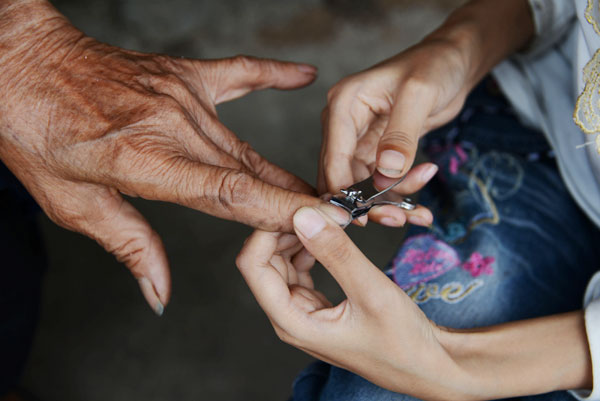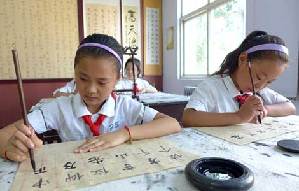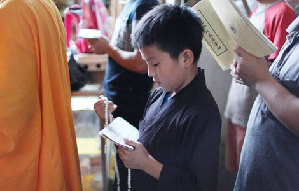Observing filial piety in China
Updated: 2013-09-05 13:32
By Zhang Shaowei (chinadaily.com.cn)
|
||||||||
 |
|
[Photo/Asianewsphoto] |
Filial piety is a concept that has been passed down from generation to generation in China for thousands of years. Most Chinese people agree that children should show filial piety to parents and other family elders, such as grandparents.
In ancient times, those who didn't treat parents well were despised by society. If an official didn't show filial piety, he was not promoted. If a scholar didn't show filial piety, his ideas were not approved by others. If a shop owner didn't show filial piety, no one would buy anything from him. And if a woman didn't show filial piety, no one would marry her. In some dynasties, having a lack of filial piety was considered a crime.
 |
|
A statue of Mencius [Photo/Asianewsphoto] |
Furthermore, a book filled with 24 stories of children showing filial piety to their parents was published during the Yuan Dynasty (1271-1368) and was popular for several centuries.
In modern times, being filial to your parents carries different meanings. Most people still agree with the first two Mencius examples, but disagree with the third one. Last year, the China National Committee on Ageing released 24 new controversial standards on what it means to show filial piety.
Some of the standards include spending festivals with parents, celebrating their birthdays, cooking for them, calling them frequently if one lives in a different city, taking photos, talking to them, supporting their hobbies, and exercising and travelling with them.
At the end of last year, visiting ones parents' became law. Some people applauded the measure, while others doubted whether it could be properly enforced due to factors such as not having enough holidays and high transportation fees.
Anyway, there is nothing wrong in doing our best to help our parents have a happy life through filial piety.
The Mid-Autumn Festival is approaching and one of the most important themes during this time is getting together with the family. Are you thinking about giving presents to your parents? Traditional presents such as clothes or giving money directly to parents may be practical, but spending time by doing something on hand may make them happier, as most parents are richer than their kids. What parents really need is our care and love.
Here are some ideas to help you get the ball rolling.
|
 |
 |

 Victoria Beckham S/S 2014 presented during NYFW
Victoria Beckham S/S 2014 presented during NYFW
 'Despicable' minions upset Depp's 'Lone Ranger' at box office
'Despicable' minions upset Depp's 'Lone Ranger' at box office
 'Taken 2' grabs movie box office crown
'Taken 2' grabs movie box office crown
 Rihanna's 'Diamonds' tops UK pop chart
Rihanna's 'Diamonds' tops UK pop chart
 Fans get look at vintage Rolling Stones
Fans get look at vintage Rolling Stones
 Celebrities attend Power of Women event
Celebrities attend Power of Women event
 Ang Lee breaks 'every rule' to make unlikely new Life of Pi film
Ang Lee breaks 'every rule' to make unlikely new Life of Pi film
 Rihanna almost thrown out of nightclub
Rihanna almost thrown out of nightclub
Most Viewed
Editor's Picks

|

|

|

|

|

|
Today's Top News
Going green can make good money sense
Senate leader 'confident' fiscal crisis can be averted
China's Sept CPI rose 3.1%
No new findings over Arafat's death: official
Detained US citizen dies in Egypt
Investment week kicks off in Dallas
Chinese firm joins UK airport enterprise
Trending news across China
US Weekly

|

|








